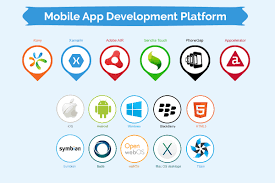Exploring the Best App Development Software
In today’s digital age, app development has become a crucial aspect of businesses looking to reach their target audience effectively. With a plethora of app development software available in the market, choosing the right one can be a daunting task. Let’s explore some of the best app development software options that can help you create innovative and user-friendly applications:
Flutter
Flutter, developed by Google, is an open-source UI software development kit that allows developers to build natively compiled applications for mobile, web, and desktop from a single codebase. Known for its fast development cycles and expressive UI, Flutter is an excellent choice for creating high-performance apps.
React Native
React Native, maintained by Facebook, enables developers to build cross-platform mobile applications using JavaScript and React. With a large community of developers and extensive third-party libraries, React Native offers flexibility and efficiency in app development.
Xamarin
Xamarin, owned by Microsoft, is a popular cross-platform app development tool that allows developers to create native iOS and Android apps using C#. Xamarin provides access to native APIs and offers seamless integration with Visual Studio, making it a preferred choice for many developers.
Appery.io
Appery.io is a cloud-based platform that simplifies app development with its visual builder and integrated backend services. Offering support for multiple frameworks like Ionic and jQuery Mobile, Appery.io is ideal for building responsive web and mobile applications quickly.
Adobe PhoneGap
Adobe PhoneGap is an open-source framework that enables developers to build cross-platform mobile applications using HTML5, CSS3, and JavaScript. With its easy-to-use tools and plugins, Adobe PhoneGap streamlines the app development process and facilitates rapid deployment across different platforms.
When selecting the best app development software for your project, consider factors such as your target platform, programming language preference, scalability requirements, and community support. By choosing the right tool that aligns with your project needs, you can streamline the app development process and deliver exceptional user experiences.
Top 5 Frequently Asked Questions About the Best App Development Software
- Which programming is best for mobile app development?
- Which platform is best for application development?
- What is the best tool to build an app?
- Which is the best software to develop Android apps?
- What is the best application software?
Which programming is best for mobile app development?
When considering the best programming language for mobile app development, several factors come into play. The choice of programming language often depends on the specific requirements of the project, the target platform, and the developer’s familiarity with a particular language. Some popular programming languages for mobile app development include Java, Swift, Kotlin, and JavaScript. Java is commonly used for Android app development due to its versatility and widespread adoption. Swift and Kotlin are preferred for iOS app development, offering modern features and seamless integration with Apple’s platforms. JavaScript is widely used for cross-platform development with frameworks like React Native and Flutter. Ultimately, the best programming language for mobile app development varies based on project needs and developer expertise.
Which platform is best for application development?
When considering the best platform for application development, it ultimately depends on various factors such as the specific requirements of the project, target audience, budget constraints, and development team expertise. Different platforms like Flutter, React Native, Xamarin, and others offer unique advantages and cater to different needs. Flutter is known for its fast development cycles and expressive UI, while React Native boasts a large community and extensive libraries. Xamarin provides seamless integration with Visual Studio for native app development. Ultimately, the best platform for application development is one that aligns closely with the project’s goals and requirements, ensuring a successful and efficient development process.
What is the best tool to build an app?
When it comes to choosing the best tool to build an app, the answer largely depends on various factors such as the specific requirements of the project, target platform, programming language familiarity, scalability needs, and desired features. There is no one-size-fits-all solution, as different app development tools offer unique advantages and cater to different development preferences. Popular options like Flutter, React Native, Xamarin, Appery.io, and Adobe PhoneGap each have their strengths in terms of performance, cross-platform compatibility, ease of use, and community support. By carefully evaluating these factors and aligning them with your project goals, you can determine the most suitable tool that will enable you to create a successful and user-friendly app.
Which is the best software to develop Android apps?
When it comes to developing Android apps, one of the most frequently asked questions is, “Which is the best software to develop Android apps?” There are several popular options available for Android app development, each with its own strengths and features. Some of the top choices include Android Studio, IntelliJ IDEA, and Visual Studio with Xamarin. Android Studio, the official IDE for Android development, offers a comprehensive set of tools and resources specifically designed for building Android applications. IntelliJ IDEA, which Android Studio is based on, provides advanced features and flexibility for developers. Visual Studio with Xamarin is a versatile option that allows developers to create cross-platform apps using C#. Ultimately, the best software for developing Android apps depends on individual preferences, project requirements, and familiarity with the tools.
What is the best application software?
When it comes to determining the best application software, the answer largely depends on the specific needs and requirements of the user or business. There is a wide range of application software available, each designed to cater to different purposes and functionalities. Factors such as ease of use, scalability, compatibility with existing systems, and support for desired features play a crucial role in identifying the most suitable application software. It is essential for users to conduct thorough research, consider their unique requirements, and possibly seek expert advice to determine the best application software that aligns with their objectives and enhances productivity effectively.

